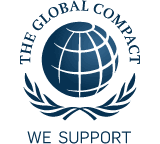Human Rights at Ford
Ford's Code of Basic Working Conditions (CBWC) articulates our commitments on key human and labor rights issues. In effect since 2003, it was formally adopted as a Policy Letter in 2007.
In early 2008, Ford joined the United Nations Global Compact, a framework for businesses that are committed to aligning their operations and strategies with 10 universally accepted principles in the areas of human rights, labor, the environment and anti-corruption. This action reinforces our commitment to outstanding performance and transparency in these areas.
Since 2003, we have developed a range of processes to ensure that our own operations and those of our business partners and suppliers are adhering to the CBWC in practice. This section describes key actions we have taken to continue to integrate human rights into our operations.
The 10 principles of the UN Global Compact
Human Rights
- Principle 1: Businesses should support and respect the protection of internationally proclaimed human rights; and
- Principle 2: make sure that they are not complicit in human rights abuses.
Labor Standards
- Principle 3: Businesses should uphold the freedom of association and the effective recognition of the right to collective bargaining;
- Principle 4: the elimination of all forms of forced and compulsory labor;
- Principle 5: the effective abolition of child labor; and
- Principle 6: the elimination of discrimination in respect of employment and occupation.
Environment
- Principle 7: Businesses should support a precautionary approach to environmental challenges;
- Principle 8: undertake initiatives to promote greater environmental responsibility; and
- Principle 9: encourage the development and diffusion of environmentally friendly technologies.
Anti-Corruption
- Principle 10: Businesses should work against corruption in all its forms, including extortion and bribery.
RELATED LINKS
- External Web Sites
DOWNLOADS
- UN Global Compact Letter from Alan R. Mulally
(126kb PDF)
